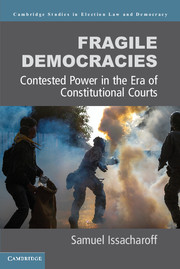Book contents
- Frontmatter
- Contents
- Preface
- Introduction: The Burden of Modern Democracy
- PART I MILITANT DEMOCRACY
- PART II COMPETITIVE DEMOCRACY
- 6 Giving Up Power
- 7 The Promise of Constitutional Democracy
- 8 Transition in South Africa
- 9 The Era of Constitutional Courts
- 10 The Constitutional Bargain
- 11 Can Law Protect Democracy?
- 12 Constitutionalism in the Time of Fragile Democracies
- Epilogue: Democratic Objectives
- Index
10 - The Constitutional Bargain
from PART II - COMPETITIVE DEMOCRACY
Published online by Cambridge University Press: 05 July 2015
- Frontmatter
- Contents
- Preface
- Introduction: The Burden of Modern Democracy
- PART I MILITANT DEMOCRACY
- PART II COMPETITIVE DEMOCRACY
- 6 Giving Up Power
- 7 The Promise of Constitutional Democracy
- 8 Transition in South Africa
- 9 The Era of Constitutional Courts
- 10 The Constitutional Bargain
- 11 Can Law Protect Democracy?
- 12 Constitutionalism in the Time of Fragile Democracies
- Epilogue: Democratic Objectives
- Index
Summary
Constitutionalism in divided societies poses a core paradox. Why would rival social groups enter into any apparently constraining constitutional bargain with imprecise terms, and why would they expect the objectives of the bargain to be honored? Societies suddenly thrust into the proto-democratic arena (like the former Soviet republics) typically lack the civil society institutions that buttress democratic rule, the political parties that can organize democratic participation, and even the basic cadre of candidates groomed in the public demeanor of democratic politics.
The immediate issue is why immature political movements in emerging democracies would look to resolve these basic constitutive problems of democracy through the creation of independent courts. This question is distinct from the more common one of what explains the long-term stability of relatively independent courts in successful democracies. Where stability can be safely assumed, sophisticated political actors operate with an understanding that who will rule at any point in the future is uncertain and they should accordingly seek to limit the ability of one or the other to exploit momentary political favor. As a result, “[e]nforcement of the constitution … might be understood as an equilibrium resulting from the tacit agreement of two or more social groups to rebel against a government that transgresses the rights of either group.” The key is that the parties believe they are participating in what may be termed a repeat game and that being ahead or behind at any point does not mean that the roles will not be reversed in the future.
Newly created democracies lack the basic confidence in the long-term stabilizing role of courts: untested democracies cannot vouchsafe that there will be rotation in office and that all political factions will ultimately benefit from some kind of arbitrated guarantee of a fair process. The first time in any exchange appears as the only engagement and the rules of repeat play only come into effect when there is a shared sense of the long term. At the moment of state creation, the only power that is likely to matter is control of the executive and, by extension, of the military.
- Type
- Chapter
- Information
- Fragile DemocraciesContested Power in the Era of Constitutional Courts, pp. 214 - 240Publisher: Cambridge University PressPrint publication year: 2015



